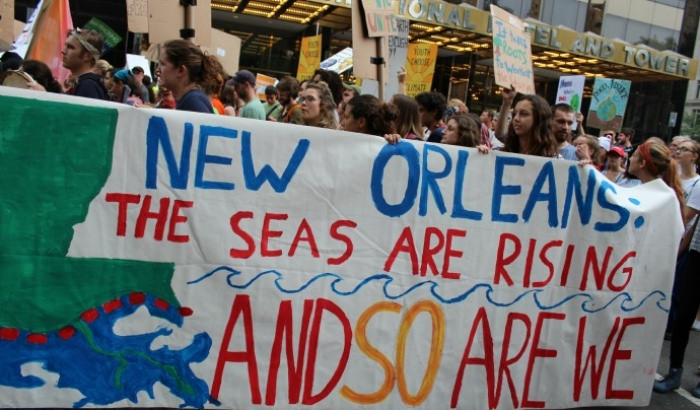Black* minds matter to the Green movement

Once again, Naomi Klein hits the nail on the head with her brilliant analysis of the connection between the #blacklivesmatter movement and the global fight against climate change. How right she is to point out the centrality of racism to the success or failure of the environmental movement.
White supremacy, with its inbuilt passivity, lack of awareness and narrow focus to which it condemns those of us living in the developed North, has wrecked countless black lives throughout history, through genocide, slavery and colonisation.
It is not a phenomenon that we can relegate to the dustbin of history. To do so would be lazy, when we are surrounded by proof that relatively ‘small’ failures to act or entrenched ways of living espoused in places inhabited by a majority of white people reverberate hugely in places inhabited by the non-white global majority.
Klein points to the difference that 2 degrees of global warming would make to Brussels (a milder climate) versus most countries located in the Global South (all-out disaster). But we may as well notice the devastating effect that our economic model has had on the countries who have espoused a model of consumerism that originated with white populations but is now endemic across the globe, making it more difficult than ever to address environmental concerns.
What does #BlackLivesMatter, and the unshakable moral principle that it represents, have to do with climate change? Everything. Because we can be quite sure that if wealthy white Americans had been the ones left without food and water for days in a giant sports stadium after Hurricane Katrina, even George W. Bush would have gotten serious about climate change. (Naomi Klein, “Why #BlackLivesMatter Should Transform the Climate Debate”).
Yet, here is an exciting proposition, Klein suggests: if we address racism, we may be able to turn around a whole lot of mistaken policies that have hampered humankind for centuries. In fact, if we not only notice that #blacklivesmatter, but decide to listen and learn from black minds, we may be surprised to discover that ending racism, the key separation among humans, could mean huge gains in the fight against climate change.
One reason may be that truly addressing racism challenges all of us to cooperate a lot more closely and awarely with each other towards a positive goal. In the process we may learn the human skills necessary to build a green economy rather than one based on greed and exploitation.
It’s what has been called ‘developing a liberatory consciousness’ by activist-academics who know how to fight racism – and win.
What is needed is a personal shift in how we each live our lives day in day out: from passive assent to destructive patterns of behaviour that don’t make sense (like condoning small daily instances of injustice) to an intentionality that doesn’t leave any aspect of the social reality that surrounds us unexamined and unchanged. As part of that tremendous learning process, those of us born white need to own up to the fact that we are largely ignorant of racism and its effects and that we need to listen to those who have faced its realities throughout a lifetime. We need to develop in ourselves the art of ally-ship, which means standing tall and pleased with our own identity but making ourselves personally accountable for the wrongs done in our name even while we act to undo them through our activism.
Closer to home, this is the challenge for the Green Party of England and Wales, brilliantly laid out by Lester Holloway. He calls on us to transform the party, taking the issue of race seriously, moving beyond the polite surface of things and making space for BAME activists in our movement, on their terms and in a way that allows them to stay and take leadership. What a gift, I immediately thought upon reading his description of mistakes we need to avoid: to be offered a window into reality by someone on the other side of the racial divide from (let’s face it) most of us active in the Green Party; to be given practical guidance on how to proceed if we want to open up our ranks to people not like us.
The Greens are perhaps better placed to build on their growing BAME support than the Lib Dems have managed. But when it comes to ‘race’ that does not mean the Greens will necessarily do any better in reality. Yet they must; it will be even more unforgivable if they too squander the presents that appear under their tree. (Lester Holloway, “Greens must not repeat Lib Dems mistakes on race”)
And because the first task of an ally is to listen and learn (on a regular basis), we would like to start a series of articles in Bright Green dedicated to how activists from BAME backgrounds see the party, the environmental movement and the activists within it.
If you are an activist from a BAME background, we would like to hear how you personally relate to the issues we fight for, how you experience us as a predominantly white party and what you think we need to do to change into an organisation that builds on and retains the support of your community.
* Black is used here in its political sense, as non-white (includes all people of the global majority).




Everybody matters to the green movement. Global warming is not just a phrase, green is not just a trend. If everybody starts caring about the nature today, the world will be a better place tomorrow.